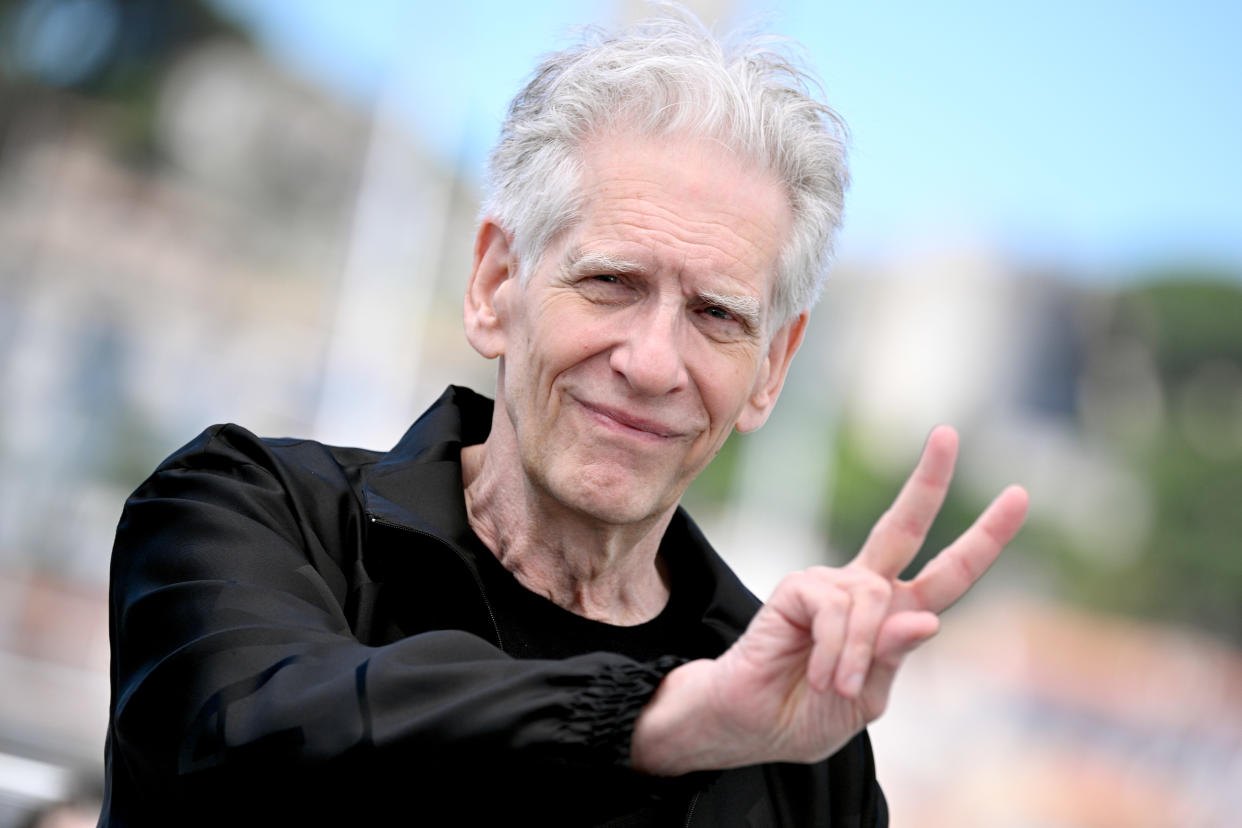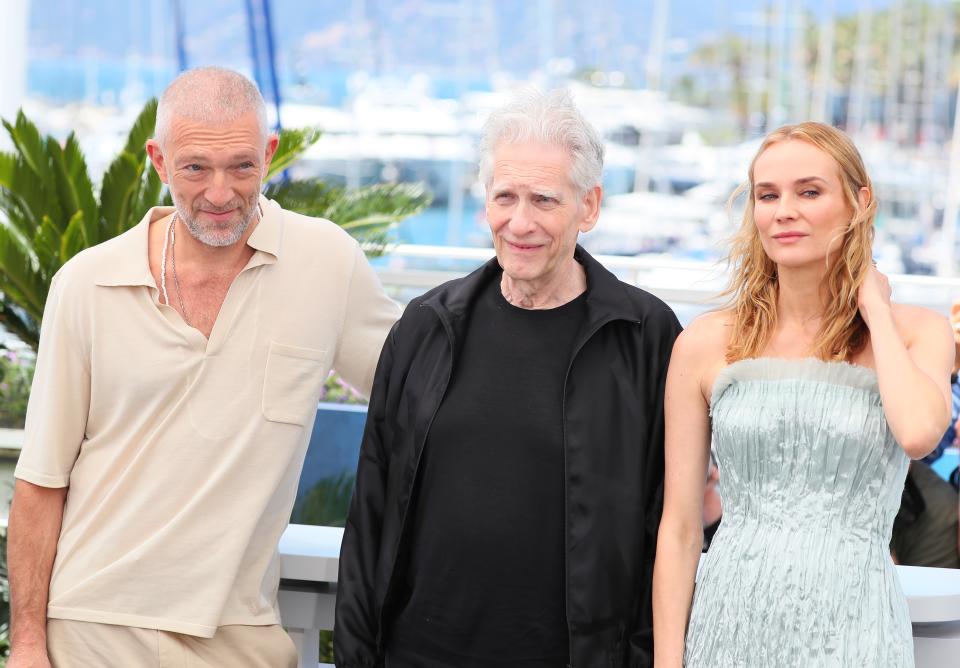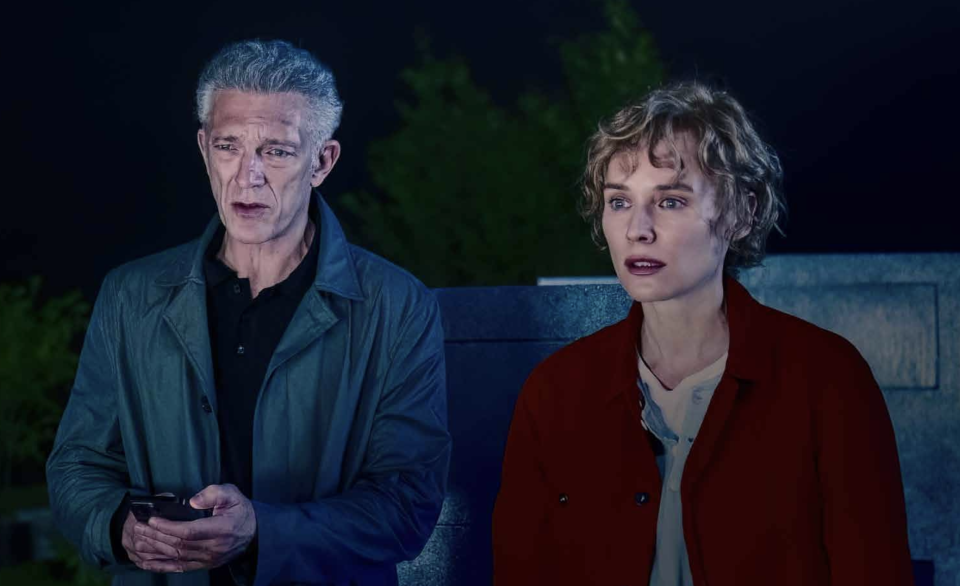David Cronenberg: ‘I’ve Never Understood the People Who Think My Movies Are Cold’

David Cronenberg always makes personal cinema, whether telepodding Jeff Goldblum into a human-sized pest in “The Fly” or asking James Spader to fuck a gaping flesh wound in “Crash.” The Canadian filmmaker will never tell you what makes his body horror classics so close to home, but he doesn’t feel it should matter to viewers anyway.
“For an average audience, they shouldn’t have to know that,” Cronenberg, behind oversized Saint Laurent sunglasses, told IndieWire at Cannes on a windy day atop the JW Marriott. “They shouldn’t have to know that it has any basis in my reality at all. The movie has to stand on its own, and you can’t expect the audience to give you credit because it’s really happened to you.”
More from IndieWire
But his latest film “The Shrouds,” his seventh to compete for the Palme d’Or at Cannes and a co-production of fashion house Saint Laurent, is undoubtedly his most personal yet. In 2017, his wife and collaborator Carolyn Ziefman died after a rough battle with cancer that put Cronenberg into a creative hiatus as he dealt with care and chemotherapy. (Cronenberg did not direct a feature between 2014’s “Maps to the Stars” and 2022’s “Crimes of the Future,” nor was he working on anything new during the emotionally taxing gap.)
“The Shrouds” stars Vincent Cassel as a businessman who looks a lot like Cronenberg himself, gray pushed-back pompadour, unassuming dark garbs and all. Cassel’s character, Karsh, has developed a technology called GraveTech wherein the bereaved can watch the corpses of their loved ones decompose via a live-streaming coffin. Karsh is grieving the loss of his wife Becca after a cancer fight. She’s played by Diane Kruger, who replaced Léa Seydoux after she dropped out of the film, and also stars as Terry, Becca’s sister and a prickly dog groomer in whom Karsh begins to substitute his dead wife. Oh, and Kruger also plays an AI avatar called Hunny, for which the actress suited up in motion capture wears, who resembles a Sim or other primitive video game character. “[Diane is] doing the performance, and then it’s being transferred, transmogrified into a sort of cartoon emoji type character,” Cronenberg said.
Despite the director’s personal ties to the project, “The Shrouds” is another upscale, arthouse sci-fi horror for adults, light on explicit emotion and heavier on ideas and dialogue about how manically searching grief can create a conspiratorial headspace. The director of “Dead Ringers,” “A History of Violence,” “Eastern Promises,” “Cosmopolis,” and “Videodrome” is often accused of making cold movies, but Cronenberg sees that as a fundamental misunderstanding.

“Honestly, I think all of my movies have a huge emotional content,” he said. “I’ve never understood the people who think that my movies are cold. I think they’re balanced, but not cold. But anyway, this one is more obviously emotional because it deals a death of a wife and it begins with that, and so I guess it’s more obviously more straightforwardly emotional than something like ‘Crimes of the Future.’” Another movie that dealt in death, decay, and biotech.
“The Shrouds” originated as a Netflix series pitch the streamer ultimately passed on after seeing drafts for the first two scripts. The feature version is “pretty close to what Netflix passed on,” Cronenberg said. The nascent series and eventual feature didn’t come to be until after his wife died, and during the years of her declining health, he wasn’t thinking about filmmaking at all.
“It was a total overwhelming experience to deal with the doctors, endless radiation, chemo, all of that. There’s no time to think about art. I wasn’t thinking about that,” he said. “I actually didn’t think I would ever address it [artistically].”
That Cassel, who previously starred in Cronenberg’s “A Dangerous Method” and “Eastern Promises,” is a dead ringer for the filmmaker here was an organic choice that will register more with Cronenberg die-hards than neophytes.
“We did talk about it certainly in terms of the accent, although he does have a French accent in the film. I said, ‘You speak much more quickly than I do. I would like your speech to be more my rhythm, which is more chilled, more soft, more relax,’” said Cronenberg, who indeed speaks in a measured, almost soothing tone when you’re sitting in front of him. “I didn’t cast him for his hair. It was a coincidence, really. I wasn’t needing him to look like me. In fact, we don’t look anything the same. For an actor, that’s an invitation to give him some grounding, some place to go. He would observe the way I move and talk and emulate, embody that to a certain extent. But not obsessively. He knew it was fiction.”

“The only thing I tried to pick up from David and that was really needed was the way he talks, which is very gentle, with that voice that is never confrontational,” said Cassel, joining the Q&A. “People talk about the magic of cinema, and in this case it really worked that way because I don’t feel like I did any effort or any study to move like David. Some people say that the best directing is really the way you look at the actors. The way a director looks at an actor makes him behave and look in a particular way. I don’t feel like we did anything, either of us, to make [me] look like that, but at a certain point, it looked really obvious I looked like him.”
Kruger is a natural entrant into the world of Cronenberg, shifting between the roles of Becca (with her, only in nightmare dream sequences featuring a haunted Karsh) and Terry so seamlessly you’d think she’d been a member of the director’s troupe all along. “I grew up with his films. ‘The Fly’ traumatized me for life,” she said. “I still remember images of it, and I wasn’t even actor. I was a kid in Germany watching films. He’s always been in my life.”
Kruger admitted to being terrified by Cronenberg’s unassuming prep process. The actors flew to Toronto a year ago and weren’t offered rehearsals or facilitated time to workshop their roles with Cronenberg before cameras rolled, a method the director regularly employs with the expectation that you’ll show up having memorized what’s on the page.
“I did try doing rehearsals with ‘The Fly.’ That was the only time, and it was a mess, because everybody gets competitive and they get snipey, and I thought, ‘This is all going to change when we get on the actual set.’ I thought I’d rather just let the actors bring me what they instinctively find and if it’s wrong and it goes off the rails, then you talk it through,” Cronenberg said. “[Vincent Cassel and Diane Kruger] brought fully formed, great performances right to the set. If I had inexperienced actors, I would give more guidance.”
“Given the subject matter, I was shocked when I got to Toronto that there wasn’t going to be table reads or very precise direction,” Kruger said. “I’ve never worked with a director who’s just like, ‘OK, I’ll see you on set.’ I remember calling Vincent. ‘What’s happening? Is this normal?’ It scared the shit out of me, I have to say. I did a lot of work on my own. [Vincent and I] did a lot of work together.”
Cassel said it’s not exactly like you “just show up on set… When you know you’ve been hired on a movie, you need to work, dream about it, inject yourself. There are a lot of things going on in your psyche and your body, and everything crystallizes the first time he says ‘action’… It’s more like a psychological preparation to be ready for anything.”
Cronenberg, who has appeared as United Federation of Planets official Kovich in only a business suit and glasses on three seasons of “Star Trek: Discovery,” said they didn’t do table reads on that Paramount+ series, either. “You have to memorize the text. You have to memorize your dialogue,” Cronenberg said. “That’s big preparation because you start to hear, ‘does this work, does this not work?'”
Moments of “The Shrouds” may remind you of Cronenberg films past, like the way Cassel and Kruger writhe intimately in shot-from-above sex scenes (both in dreams and reality) as Karsh channels his grief into a physical release. I thought of “Crash,” Cronenberg’s controversial 1996 Cannes Special Jury Prize winner, where the bodies of Spader and Deborah Kara Unger engage in a clinical ballet of lovemaking. But Cronenberg insists he’s not bringing past work into his present projects or being self-referential at all.
“Other than the experience and confidence you have knowing that you now, [while] not totally having ever mastered the craft, but enough [so],” he said. “Because it’s coming from my nervous system, there will be connection to my other films that people talk about. But for me, that gives me nothing. Nothing.”
“The Shrouds” premiered at the 2024 Cannes Film Festival. It is currently seeking U.S. distribution.
Best of IndieWire
Sign up for Indiewire's Newsletter. For the latest news, follow us on Facebook, Twitter, and Instagram.